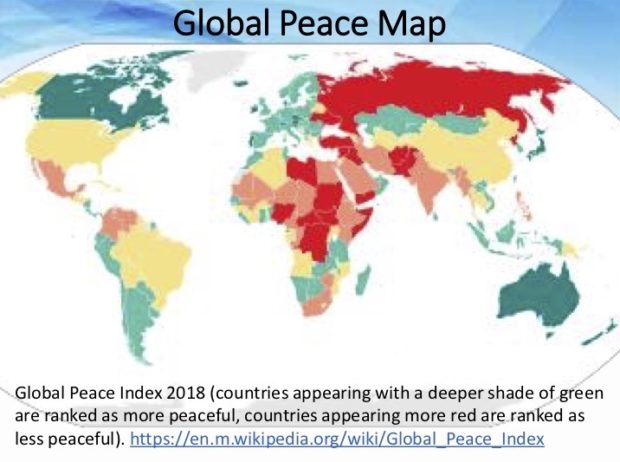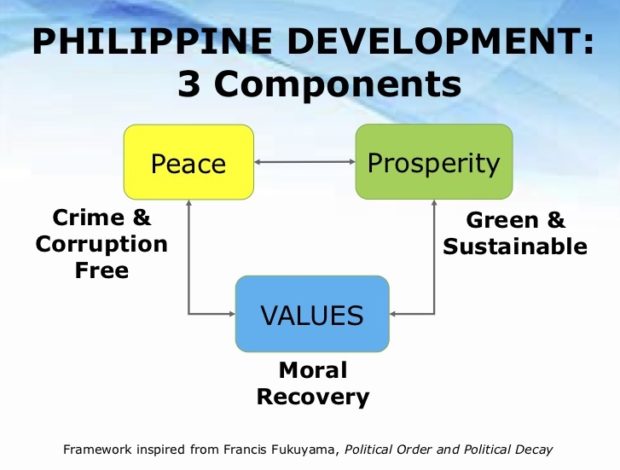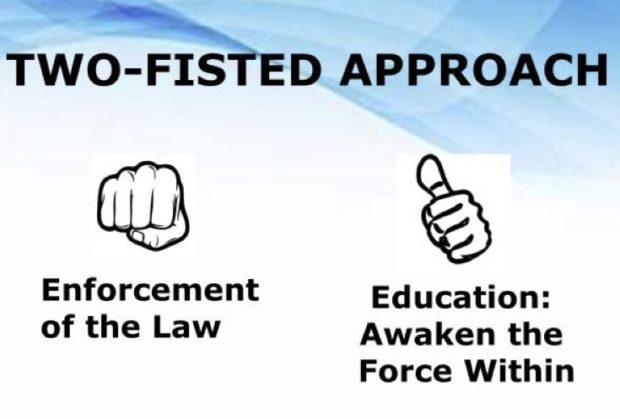What do we want? Do we believe it is possible to have a crime-free society, where crime is the exception and not the norm?

Let us look at where the world is today with regards to crime. Look at what we can infer and conclude from the map (Global Peace Index) above. There are some highly developed and rich countries with high crime, and relatively poor countries that have a low incidence of crime. Crime is not a function of income, race, religion, and ethnicity. What, therefore, is the determinant of peace and order? How can we create the vision of a crime free and prosperous country and make it a reality in our lifetime?
First, the key is understanding crime and its genesis. Crime is not hereditary, nor is it congenital. There is no one who is born a criminal. The evidence is that human beings are born basically good, learning like a blank slate to survive within their environment.
Crime is learned with the loss of self-respect, that is born from a degrading environment. When we understand how an individual’s personal ethic interacts and is molded with the moral code of a group or a society, we can then create a law enforcement and justice system that can effectively stop crime and rehabilitate criminals. Moreover, we can build a society that can prevent and avoid the development of criminals in the first place.
There are two essential factors:
Internal-Personal: Loss of self-respect — when one takes on a personal belief, or ethic, that one cannot survive without taking on a victim-victimizer identity; when one is bewildered, unable to learn, believing oneself as stupid.
External-Social: When the internal identity is molded from an environment where one is continuously and systematically abused, suppressed, degraded, tortured, or beaten down. It is when society turns a blind eye, condones, accepts and agrees to a moral code that these behaviors are normal. As an example, you can have a socially prevalent practice of adultism (oppression of children by adults) and sexism (oppression of women by men).
How to create a crime-free and peaceful society? A socio-economic model inspired by Francis Fukuyama, from his book Political Order and Political Decay, offers a framework for development that has been historically observed. It is a society governed by the rule of law and with an economic system that allows for a relatively equal opportunity to prosper. Such a society is grounded on commonly accepted ideals or values; a moral code that is enacted into laws and enforced within a justice system. We understand in these Three Components of Development, how a peaceful and prosperous society can be built from a foundation of ethics and values. The history of civilizations have shown their rise and fall from the strength and weakness of the ethics and values in society.
Global best practices
Significant crime decline has been seen in the large urban center of New York City with its Broken Windows theory of policing and public order. Colombia, meanwhile, has the Two-Fisted Approach of Law Enforcement with Values Education.
My own personal experience in the rehabilitation of prisoners and reversing recidivism in the California Penal System has inspired me. With the use of a common sense guide to ethical behavior, in the booklet The Way to Happiness, I saw a practical and effective methodology. Validated evidence shows that with a simple yet powerful, ethics and values approach, it is possible to reverse criminality and create a social order that is virtually crime free.
The global best practices of The Way to Happiness, together with moral codes, like the 4-Way Test of Rotarians, is what creates the foundation for sustainable development that is crime and corruption free.
A values formation and Moral Recovery Campaign that is institutionalized by Government and Civil Society, in a nonreligious and nonpolitical way, is the sustainable foundation that works. It requires a leadership resolve and quick action by government and civil society.
As such, there is an initiative to reactivate-rename the 2004 Philippine Executive Order 314, and updated as the Presidential Commission on Values-Formation, Ethics, and Happiness, CVEH. This aligns with the United Nations Sustainable Development Goals, and will distinguish the Philippines as the first ASEAN country and 6th in the world, that has a focus on measuring the GNH, Gross National Happiness Index of the country.
With understanding and insight, a consultation process with the 600 attendees of the recent Anti-Crime Summit was formulated for resolutions and action steps. The goal is to help guide government and Civil Society with action points to Stopping Crime Against Women and against crime in general.
Three Resolutions where asked in each of the 7 Areas: Legislation; Enforcement; Communications; Ethics and Values; Economics; Culture and Sports; Family and Marriage. This will be submitted as the 21 IKAW Resolutions. I will discuss the 21 Resolutions in my next column.
(Excerpted from a speech delivered in the Anti-Crime Summit, IKAW (Ihinto Krimen Against Women held on April 23, 2019 at the Manila Hotel. The Summit was organized by the Public Attorney’s Office, PAO, and the Volunteers Against Crime and Corruption, VACC and supported by the Presidential Anti-Crime Commission, Department of Interior and Local Government, Rotary International District 3830, and the Way to Happiness Philippines Foundation.)
Jorge “Jerry” Perez de Tagle, lives in the US and the Philippines, is an author and change management consultant for the private and public sector. He taught at Syracuse University, New York and has his PhD in Social Change, Honoris Causa, and is a PhD Candidate in Organization Development. He was one of the 10 Outstanding Entrepreneurs in 2009 and is now the National Chairman of The Way To Happiness Philippines Foundation, and is the Vice President for Global Outreach with the US Federation of Philippine American Chamber of Commerce.



